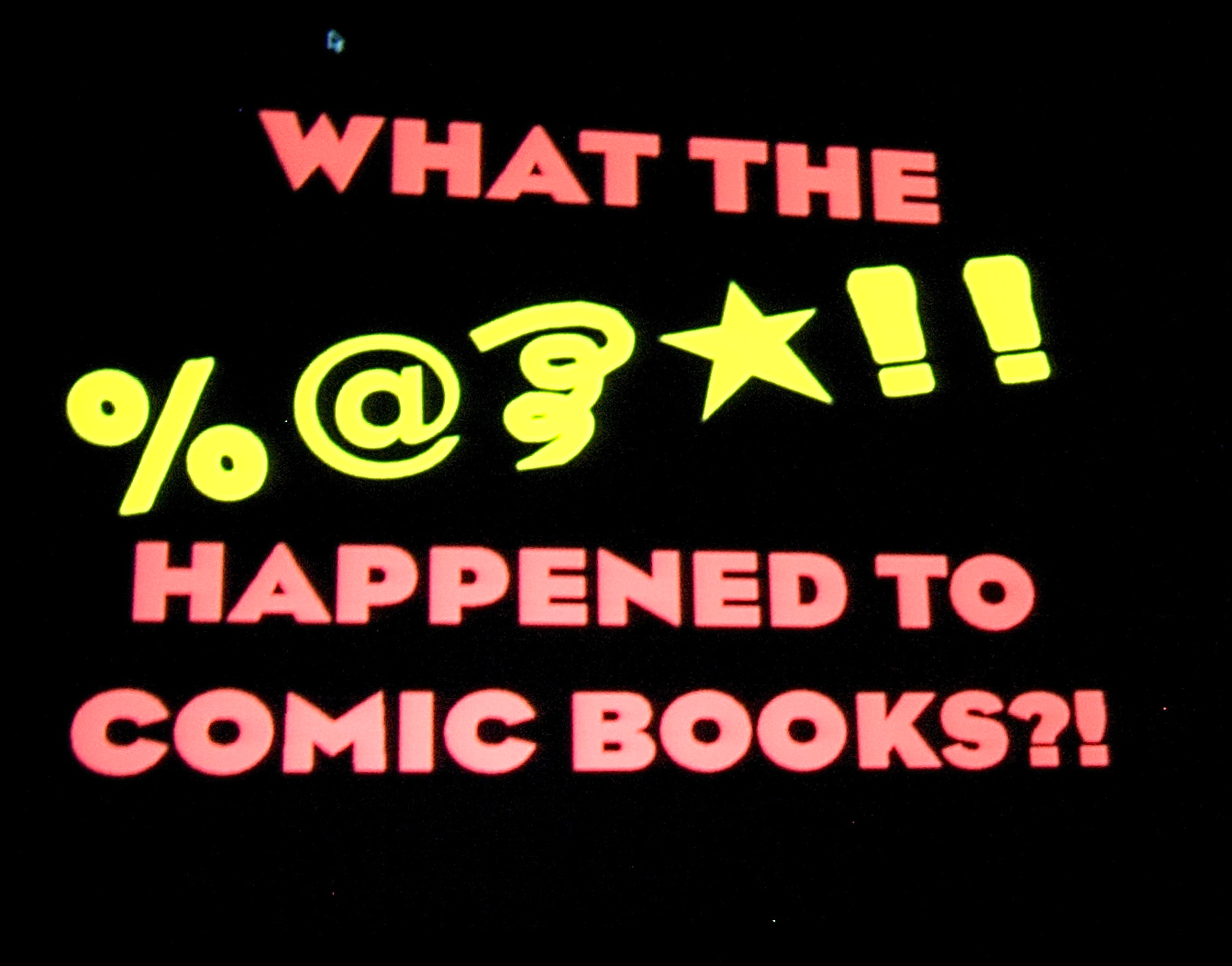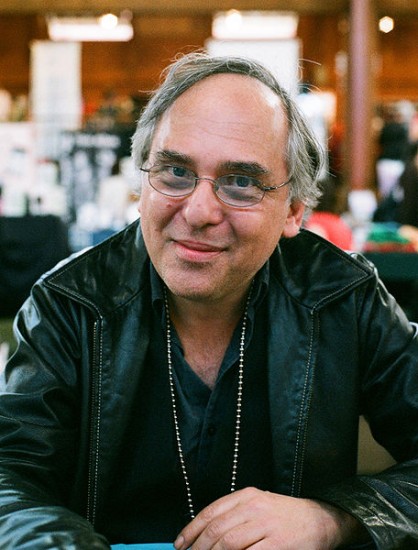I spilled a hot cup of cider on my sweater when I saw Art Spiegelman lounging with English professor and Writer in Residence Blanche Boyd outside of Shain last Tuesday. Pulling wet wool from my skin and maintaining an air of cool in front of the Pulitzer Prize-winning graphic novelist of Maus were mutually exclusive events. I mopped myself off with a fistful of napkins and stared over at Art with a look later described by Boyd as “groupie-ish.”
It was impossible not to stare as Spiegelman relaxed before his afternoon panel event. I read enough Maus in school to be in awe of the legendary cartoonist. There he was, stroking a salt and pepper beard and smoking his school spirit in the form of a Camel cigarette. My admiration for Spiegelman was clearly matched by the many members of the Conn community who crowded the Ernst Common Room to watch him discuss his cartooning career with English professors Lina Wilder, Jeff Strabone and Boyd, who is also the director of Connecticut College’s Daniel Klagsbrun Symposium on Creative Arts and Moral Vision, which sponsored the event.
Spiegelman’s defining work, Maus, is a 1986 graphic novel which tells the story of his father’s life and imprisonment in the Auschwitz concentration camp, and depicts Jews as mice and Germans as cats. From the very beginning of the panel event, Spiegelman tended to shy away from discussing his masterpiece in favor of talking about his love for the art and history of comics, which Spiegelman said developed compensatorily as a way to counteract having a lack of skill in baseball. Though he gamely responded to the questions posed by the professors addressing the origins of Maus and his views on “Holokitsch” (the oversentimentalization and exploitation of the Holocaust in popular media), Spiegelman made it clear that he has never been interested in being “the Elie Weisel of comic books.” His goal in creating Maus was never to represent a population at large and, in downplaying the novel’s iconic status, said that it “was understandable because when I made Maus, there was no context [for comparison].”
Spiegelman is an orator of the highest order — his off-the-cuff anecdotes, self-deprecating humor and love of wordplay combine in the most engaging way. With a speaker as dedicated to the preservation of the history of comics as Spiegelman is, it is impossible not to be swept up by his passion for finding the perfect font (“I settled on one halfway between handwriting, to show spontaneity, and typewriting, to show clarity”) or seeing every element of drawing style as an aspect of narrative. I was taken by his theory that comics are a superior act of artistic compression when compared to photographs, explaining that a photographer loses control when random objects enter the frame while a cartoonist has the power to command every detail in a strip.
“Comics,” Spiegelman said, “can juxtapose the past and present in a way that mirrors how [humans] think. In that way, comics can be more real than a photo or video.” As Spiegelman once told an NPR interviewer, “I think anybody who liked Maus had to acknowledge that it couldn’t have happened in any other idiom [besides a comic].”
It is clear that comics, elevated and made a more significant medium in the world as a result of his work, give Spiegelman a singular thrill and he did an excellent job of transferring that enthusiasm to the audience in Ernst.
Cartoons and aesthetics aside, the narrative of Maus, which is dense with heartbreak, is briefly unwound by Spiegelman’s rumination that “the reader navigates through [the text] by understanding the relationship of the father and the son” and that he “ultimately wouldn’t know how to enter the story without [him]self.”
“The line between fiction and nonfiction is blurry,” Spiegelman said. “[In making Maus] it was my job to find out as much as I could and put in everything it took to communicate that. If I put in everything I wanted to, every mouse would be carrying a five-foot high word balloon. All art is shaping.”
As warm and bright as Spiegelman is, his voice was curt when discussing the strained relationship with his father, Vladek, described in MetaMaus as “a distant and authoritarian figure.” Describing himself as “a lunatic in a different way than my father was,” Spiegelman used comics and humor as a child to break away from his tumultuous home life, saying that “Mad Magazine was an escape clause in that hot house.” Spiegelman’s art, in many ways, served as navigation of the overspill in the dichotomy between his father’s life and his own. Towards the end of Vladek’s life, when both his memory and relationship with his son were slipping, Spiegelman “would have to sift through and compare every anecdote to find what was true.”
The discussion ended on this sobering note, and after a cavalcade of faculty members, students and members of the greater New London community pulsed past him offering congratulations, Mr. Spiegelman took in a quiet moment and another cigarette. A student sped up and brandished her worn paperback at him, explaining that she couldn’t attend the book signing scheduled for that evening. Spiegelman’s tour rider specifically stated that he would not sign any book except for the newly released MetaMaus and he made no effort to hide his annoyance at being presented with Maus. Irately biting the cap off the student’s pen and repeating that he did not come here to sign this book, he scribbled his name in the corner of the title page and shuffled away — pen cap and cigarette both still grinding between his teeth.
I hid the wildly expensive deluxe copy of The Complete Maus that I had just purchased between two textbooks and scuttled off, feeling the lightness of my wallet and the disappointment of having a grumpy hero. However, after devouring the first chapter of MetaMaus, I began to understand Spiegelman’s aversion to his classic work — among the many purposes of creating Maus, besides Spiegelman’s hope to make a “long comic book that needed a bookmark and could be reread,” was exorcising family tragedies and releasing himself from the shackles to his father’s story. Due to the groundbreaking nature of Maus I and Maus II, which Spiegelman continues to claim was “purely accidental,” the tremendous amounts of acclaim came with the new burden of lugging around the legacy of a masterpiece that Spiegelman feels still “looms over me like my father once did.”
The man haunted his entire life by the weight of his father’s story is forced to trot out the same answers to the same personal questions regarding his family, his mice and the Holocaust at every speaking engagement. He has justifiably been hardened by twenty years of interviews focused solely on his defining project, as what might have seemed at first to be the upheaval of a heavy load of family history has dropped the equally tremendous yoke of fame upon his shoulders. One of Spiegelman’s goals in putting together MetaMaus (his newly released book looking back at the creative process of making Maus, which includes a DVD of multimedia encompassing a rich collection of documents, audio and raw sketches) is to empty out the bottomless well of Maus questions — and to hopefully never be faced with them again.
It isn’t certain whether or not Spiegelman can fully grasp his own creation as the act of heroism it is hailed as. He is equal parts the punk from Queens who learned to read from Batman comic books and the genius visionary “stuck in a mouse mask.” The struggle of distancing himself from his greatest work, of changing back from a mouse into a man, will continue as long as Maus, however unintentionally, sweeps the masses up with the bleeding history of a man and his people.
I walked past Spiegelman on my way out of his evening lecture and offered him shy congratulations. He was exhausted from a day of talking and hand shaking but took the time to grasp my wrist, ask my name and thank me kindly. He packed up his leather bag and strode out the door past yet another reception full of fans nibbling on cheese and squeaking praise. He hammered away at the night with heavy steps, another cigarette dangling from him fingers, poised to receive the flame.












Beautifully and intelligently written – no surprise! Thanks for the wonderful account of this ‘grumpy hero.’
[…] Of MetaMaus and Men I hid the wildly expensive deluxe copy of The Complete Maus that I had just purchased between two textbooks and scuttled off, feeling the lightness of my wallet and the disappointment of having a grumpy hero. However, after devouring the first chapter … Read more on The Connecticut College Voice […]
dude, you made it to sharkpack.biz. i could be mistaken, but i think this is a Big Deal.